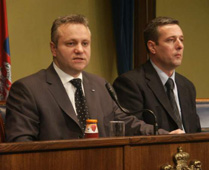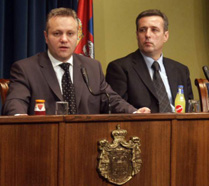Q:
A:
Agreement with IMF to speed up EU association process
Belgrade,
20 April 2005
Serbian Minister of Finance Mladjan Dinkic said today that the agreement in principle that the Serbian government delegation reached with the International Monetary Fund (IMF) is very important because it gives Serbia an opportunity to extend its three-year arrangement with the IMF, which expires on May 15, and to continue cooperation with the World Bank.
Dinkic said at a press conference today that this agreement opens the way for a much quicker process of EU association, and it also enables the write-off of a $700 million debt to the Paris Club of Creditors. After that, Serbia's total public debt will have been reduced to under one-third that of five years ago.
Speaking about the results of the visit to Washington, Dinkic voiced hope that the IMF's Board of Directors will approve the fifth review of the three-year arrangement in June, which will result in the release a $200 million loan to the National Bank of Serbia for filling foreign currency reserves so as to improve Serbia's balance of payment position.
He explained that after that the sixth review should come, which could be completed between September and November this year.
Dinkic said that according to this arrangement, the main goal for 2005 will be to cut the foreign trade deficit to 11 percent of GDP.
Last year the foreign trade deficit increased dramatically because an 8 percent increase in GDP was followed by an increase of imports, resulting in a foreign trade deficit of 13.7 percent of GDP.
The reduction of the foreign trade deficit calls for a boost in exports by at least 25 percent, the Minister said and added that Serbia's exports have recorded an upward trend since August 2004, which is a result of direct foreign investment and privatisation.
Dinkic said that it is necessary to limit the rise in imports, which according to the IMF should not exceed 9 percent in relation to the last year. Dinkic noted that to do that, it is necessary to limit local market demand and for that three types of measures are envisaged. He went on to say that these are monetary measures, first of all the control of increased approval of loans to citizens, then fiscal measures in the form of a reduction of public spending and wage policy, meaning that wages can be increased only in line with productivity.
Speaking about the results of the visit to Washington, Dinkic voiced hope that the IMF's Board of Directors will approve the fifth review of the three-year arrangement in June, which will result in the release a $200 million loan to the National Bank of Serbia for filling foreign currency reserves so as to improve Serbia's balance of payment position.
He explained that after that the sixth review should come, which could be completed between September and November this year.
Dinkic said that according to this arrangement, the main goal for 2005 will be to cut the foreign trade deficit to 11 percent of GDP.
Last year the foreign trade deficit increased dramatically because an 8 percent increase in GDP was followed by an increase of imports, resulting in a foreign trade deficit of 13.7 percent of GDP.
The reduction of the foreign trade deficit calls for a boost in exports by at least 25 percent, the Minister said and added that Serbia's exports have recorded an upward trend since August 2004, which is a result of direct foreign investment and privatisation.
Dinkic said that it is necessary to limit the rise in imports, which according to the IMF should not exceed 9 percent in relation to the last year. Dinkic noted that to do that, it is necessary to limit local market demand and for that three types of measures are envisaged. He went on to say that these are monetary measures, first of all the control of increased approval of loans to citizens, then fiscal measures in the form of a reduction of public spending and wage policy, meaning that wages can be increased only in line with productivity.
Dinkic reported that Serbia completed its budget adjustment last year when the budget deficit was reduced by 2.2 percent of the GDP, or 35 billion dinars. According to this year’s plan, Serbia should additionally reduce the budget deficit by 1 percent, or 16 billion dinars, which means that the country would have a budget surplus this year.
According to Dinkic, this year’s revenues should be 35 to 40 billion dinars higher than the plan defined in the Budget Law. Expenditure will also rise, by 20 to 25 billion dinars, he said.
The Finance Minister announced that the government will reform the pension insurance fund and adopt a new bill on public companies.
He also said that the government agreed with the World Bank on a development loan worth $55 million and another loan worth $190 million.
The IMF and the World Bank positively assessed the structural reforms in Serbia, particularly in Serbia’s banking sector, Dinkic said.
According to Dinkic, investment projects worth $210 million were agreed upon with World Bank representatives, $135 million of which are ready this year. The funds will mainly go to road rehabilitation ($55 million), reforming the pension system ($25 million), building an irrigation system ($25 million) and reconstruction of the Bor region ($25 million), said Dinkic.
According to Dinkic, this year’s revenues should be 35 to 40 billion dinars higher than the plan defined in the Budget Law. Expenditure will also rise, by 20 to 25 billion dinars, he said.
The Finance Minister announced that the government will reform the pension insurance fund and adopt a new bill on public companies.
He also said that the government agreed with the World Bank on a development loan worth $55 million and another loan worth $190 million.
The IMF and the World Bank positively assessed the structural reforms in Serbia, particularly in Serbia’s banking sector, Dinkic said.
According to Dinkic, investment projects worth $210 million were agreed upon with World Bank representatives, $135 million of which are ready this year. The funds will mainly go to road rehabilitation ($55 million), reforming the pension system ($25 million), building an irrigation system ($25 million) and reconstruction of the Bor region ($25 million), said Dinkic.












